Key takeaways:
- Reparations resources include tools for addressing historical injustices through monetary compensation, land restitution, and educational programs, emphasizing community empowerment and awareness.
- Engaging in reparations politics fosters important conversations that can lead to community healing and inspires collective responsibility for advocating change.
- The concept of acknowledgment is critical in reparations, as recognizing historical pain is necessary for fostering discourse and promoting justice.
- Current initiatives, like those in Evanston and discussions at the federal level, show a growing movement toward addressing historical injustices and the need for accessible reparative measures.
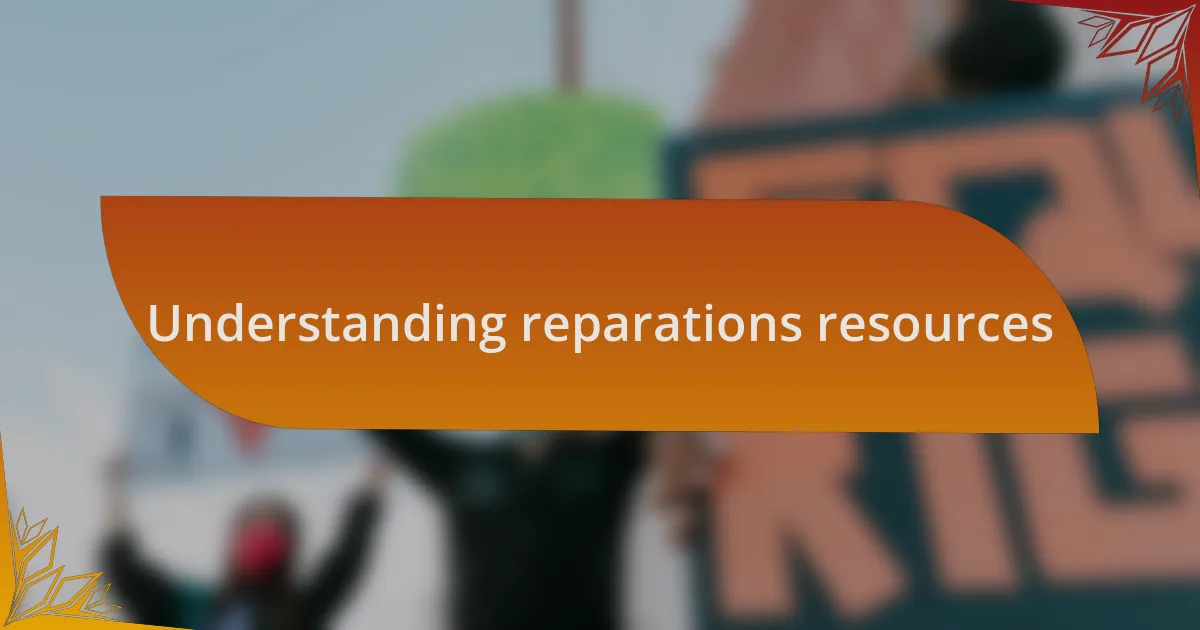
Understanding reparations resources
Reparations resources encompass a wide range of tools and information that aim to support communities seeking to address the historical injustices of slavery and systemic oppression. I remember the first time I came across comprehensive reports and studies that highlighted various forms of reparations—monetary compensation, land restitution, and even educational resources. It was eye-opening to see how these resources not only provide data but also help create a narrative for healing.
As I delved deeper into this topic, I found that it often becomes a conversation starter among friends and family. It begs the question: How can we use these resources in our communities to facilitate change and promote awareness? For me, engaging with local advocacy groups transformed my understanding; it showed me that these resources don’t just exist in text—they are alive within the actions and activism of real people who are committed to making a difference.
One striking example of successful reparations resources is the way certain municipalities have implemented community reinvestment programs. These initiatives aim to address the socioeconomic disparities that persist today, but their effectiveness relies heavily on how well they are understood and utilized by the community. When I witnessed local workshops aimed at educating residents about these options, it was clear to me that the true power of reparations resources lies in their ability to empower individuals and foster a sense of communal responsibility.
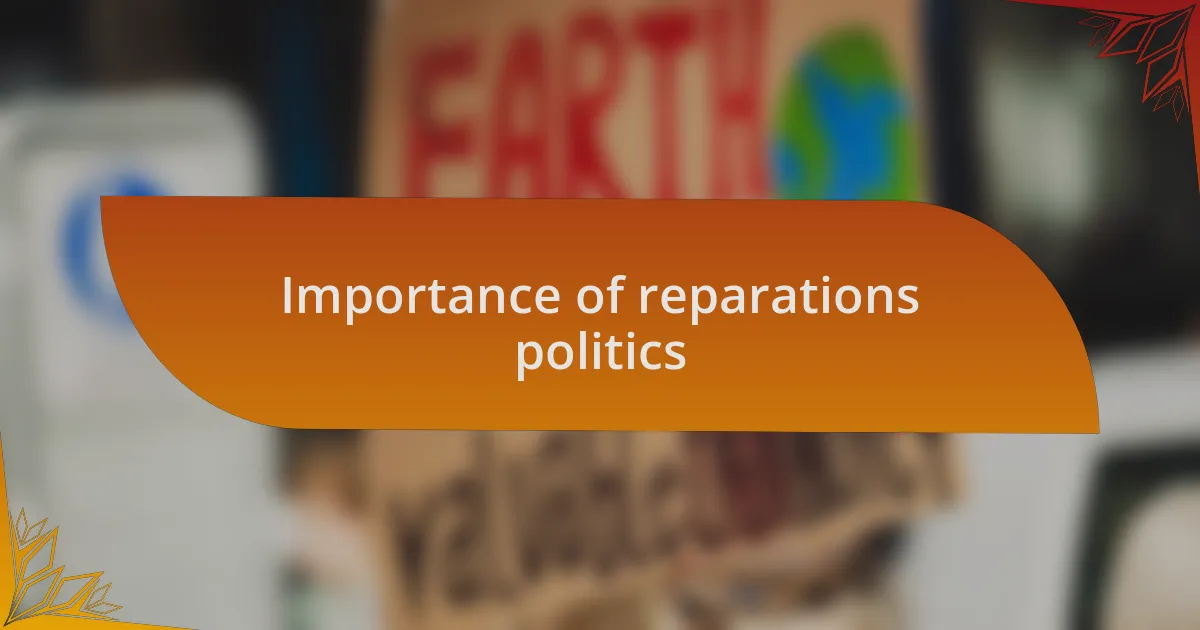
Importance of reparations politics
The importance of reparations politics cannot be overstated, as it serves as a crucial mechanism for addressing past injustices. I often think about the profound impact that acknowledging historical wrongs can have on community healing. When discussions arise about reparations, I feel a palpable shift in the room—people become more engaged and ready to confront uncomfortable truths. These conversations, albeit challenging, can pave the way for a more equitable future.
In my experience, reparations politics also compels us to reflect on our societal values. I remember attending a town hall meeting where residents voiced their opinions on reparations policies. The stories shared were not just statistics; they were personal memories that reverberated with emotion. It struck me how tangible historical injustices can affect generations, inspiring a collective responsibility to advocate for change.
Moreover, the role of reparations politics in policy-making cannot be ignored. As I explored this topic, it became clear that successful reparations initiatives depend on public engagement and informed dialogue. When I see communities rallying around proposals for reparative measures, I feel a sense of hope. Isn’t it encouraging to think that through understanding and advocacy, we can enact real change? I believe that the journey toward reparations is not just about compensation; it’s about creating a legacy of justice and trust.
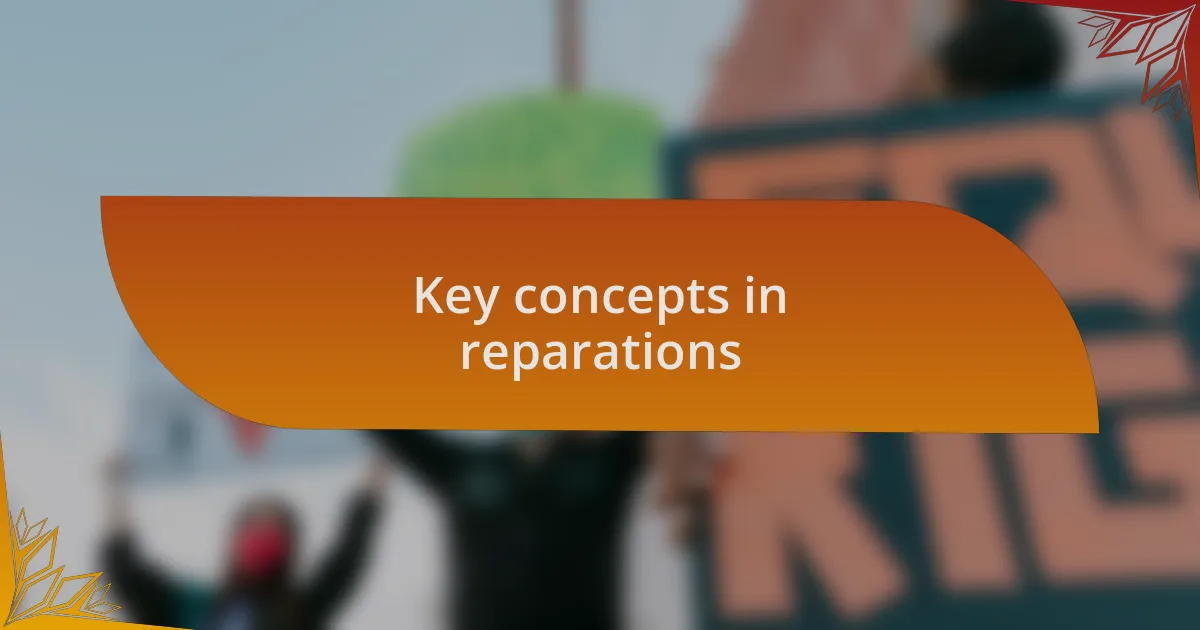
Key concepts in reparations
When diving into the key concepts of reparations, one cannot overlook the principle of acknowledgment. I remember a conversation with a friend who shared her family’s history, revealing how untold stories of suffering can illuminate the path toward understanding. I often wonder, how can we move forward as a society without first recognizing the pain that has shaped so many lives? This foundational step is crucial; it helps communities validate their experiences and prompts a deeper discourse on justice.
Another vital aspect is the notion of restitution, which encompasses both financial compensation and social equity measures. I was at a community meeting where a local leader passionately spoke about the need for reparations to address systemic inequalities. It made me realize that reparations aren’t just about money; they also involve restoring dignity and offering opportunities that have long been denied. How can we truly remedy the past if we don’t consider these broader elements?
Lastly, the idea of transformative justice plays a pivotal role in reparations discussions. I recall attending a workshop where participants shared innovative ideas about how reparations could create systemic change rather than merely serving as a Band-Aid. This dialogue resonated with me deeply—why settle for superficial changes when we can reshape our institutions for true justice? It struck me that reparations are not just a financial pursuit but a chance to foster genuine relationship-building within communities that have been historically marginalized.
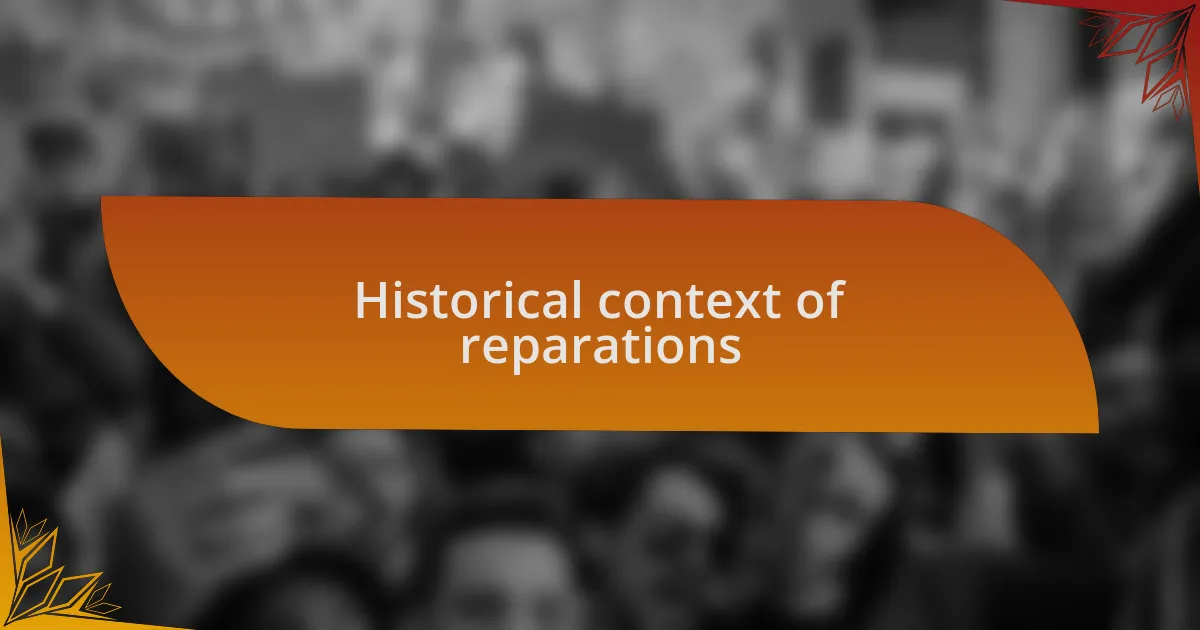
Historical context of reparations
Reparations have a long and complex history, rooted in the aftermath of slavery and colonialism. I remember reading about the debates surrounding reparations for enslaved people in the United States, especially the discussions sparked after the Civil War. It was fascinating—and a bit troubling—to think about how the promises of freedom weren’t truly fulfilled for so many. How can societies confront their past injustices if they leave these significant pledges unaddressed?
In various parts of the world, reparations have emerged as a response to colonization. For instance, I learned about Germany’s settlements to Holocaust survivors, which highlight the global acknowledgment of historical wrongs. I can’t help but feel a sense of urgency: if nations can take steps towards restitution for past atrocities, why does it feel so challenging for others to do the same? It’s a poignant reminder that the past continues to shape our present, and the echoes of these injustices demand attention.
Furthermore, the historical context of reparations reveals a pattern of resistance in addressing systemic racism. When I reflected on the resistance faced during the civil rights movement, I realized how difficult it has been to progress towards reparative justice. This makes me ask, what are we still afraid to confront? The insistence on reparations is not merely about addressing past grievances; it’s about paving a more equitable future for generations to come. Understanding this legacy is crucial for anyone engaged in the reparations dialogue.

Current reparations initiatives
In recent years, various communities across the United States have launched reparations initiatives aimed at addressing the historical injustices faced by Black Americans. For instance, cities like Evanston, Illinois, have introduced programs to allocate funds specifically for Black residents, helping them tackle issues like housing discrimination. I remember feeling a spark of hope when I read about this initiative; it demonstrated a tangible step towards acknowledging past wrongs. Could this approach pave the way for larger-scale policies in the future?
Additionally, at the federal level, discussions surrounding reparations continue to gain traction, with proposals such as H.R. 40 seeking to establish a commission to study and develop proposals for reparations. I find it intriguing how these conversations often bring together diverse voices, revealing a spectrum of opinions that reflect our society’s complexity. Isn’t it vital that we listen to these perspectives to fully understand the implications of reparative measures?
Other countries also inspire current reparations initiatives. Take the example of Canada, which has taken steps to compensate Indigenous communities for the wrongs done through residential schools. Reflecting on this, I wonder how such examples can motivate grassroots movements around the world. Ultimately, the actions of today echo the conversations of yesterday, underscoring the pressing need for acknowledgement and restitution that can heal the wounds of the past.
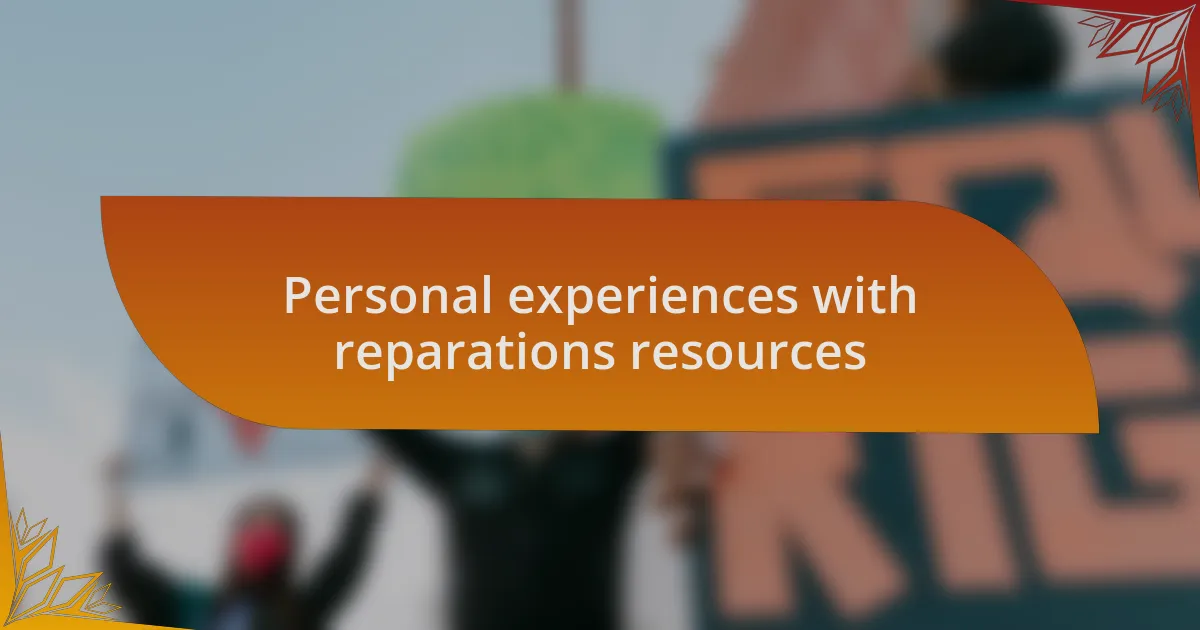
Personal experiences with reparations resources
Engaging with reparations resources has been a deeply personal journey for me. I recall attending a workshop about funding for Black-owned businesses, hearing stories that resonated with my own family’s struggles. The emotions in that room were palpable—there was a sense of shared history. Wouldn’t it be incredible if these resources could foster not just economic empowerment but also a renewed sense of community?
In exploring initiatives, I also discovered local organizations providing legal assistance to navigate housing disputes. The experience was eye-opening as I saw how bureaucracy can be a barrier to accessing these resources. I remember talking to a woman who had been fighting unjust eviction for years; her resilience highlighted the urgent need for support systems that truly advocate for justice. Isn’t it essential that these resources become more accessible to those who need them most?
Another impactful moment was witnessing a community meeting focused on creating a reparations proposal for our city. Listening to various perspectives, I felt a profound sense of connection and responsibility. It was heartening to see people engage passionately, discussing not only what reparations could look like but also how we might heal collectively. This dialogue made me realize that reparations aren’t just monetary; they’re about restoring dignity and building trust within our communities.
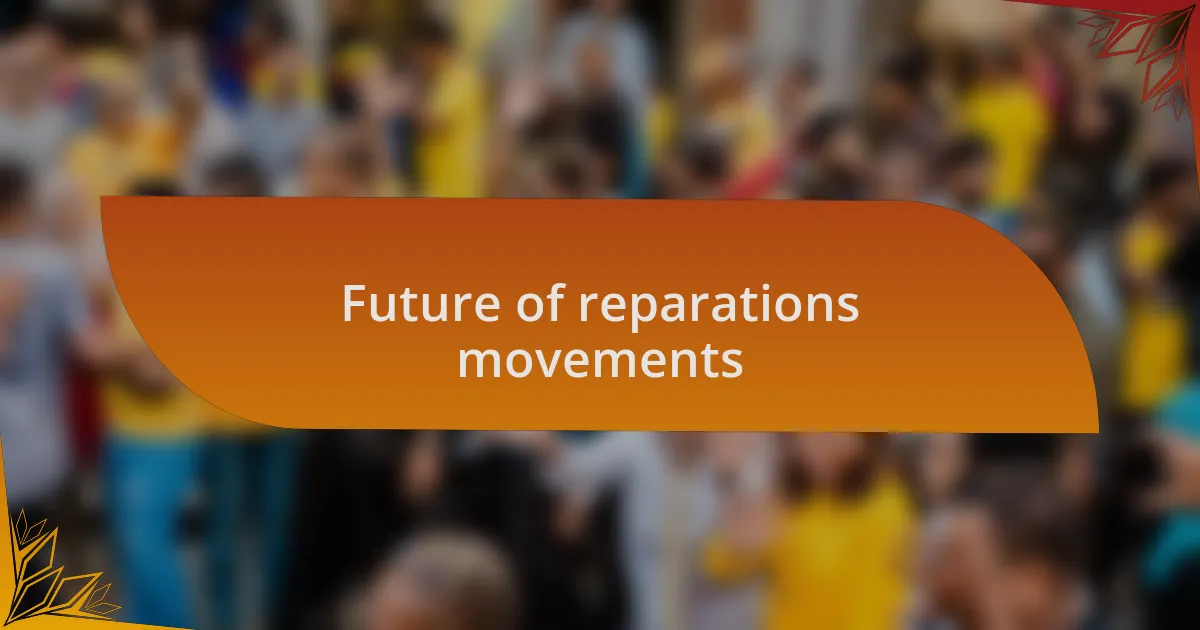
Future of reparations movements
The future of reparations movements hinges on a collective understanding of history and its ongoing impact. I remember speaking with an elder in my community who shared how past injustices continue to shape lives today. It struck me how crucial it is for younger generations to be educated about these narratives; after all, knowledge can drive change, but how can we ensure it’s shared effectively across communities?
As discussions evolve, I see potential in blending both grassroots efforts and institutional support. During a recent town hall, we discussed integrating reparations into local policies, which felt like a pivotal moment—it was as if the air buzzed with possibility. I couldn’t help but wonder, are we on the brink of a more inclusive approach that recognizes both monetary and non-monetary forms of reparations?
Looking ahead, I envision reparations movements becoming a broader coalition that includes diverse voices advocating for systemic change. I recall a vibrant debate among advocates where we explored how environmental justice intertwines with reparations for marginalized communities. Can we create a narrative that not only addresses historical injustices but also champions sustainability and health equity? It’s a daunting challenge, yet the passion I’ve witnessed leads me to believe that the path forward is ripe with opportunity.